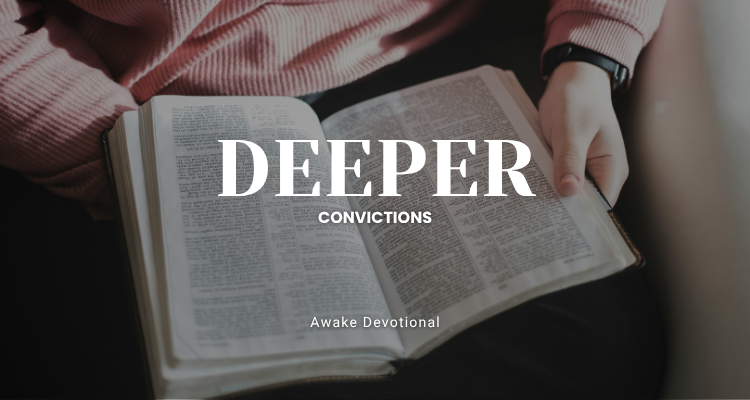
Deeper: Convictions
Daniel 3:16-18
In ancient Rome, there was a man named Polycarp, a disciple of the apostle John. At 86 years old, Polycarp was brought before a Roman proconsul and ordered to renounce his faith in Christ.
His response was simple yet profound: “Eighty-six years I have served Christ, and He has never done me wrong. How can I blaspheme my King who saved me?” Polycarp knew that execution was at stake, but he stood firm displaying deep conviction in his faith.
As profound as Polycarp’s story is, it is not unique. Throughout church history and in Bible times, men and women have faced unimaginable trials with unwavering faith because their convictions were rooted in something greater than themselves. Their stories challenge us to ask: “What convictions am I building my life upon?” In a world that constantly tests your faith, answers to questions like this can enable you to stand firm, even when the stakes are high.
Daniel 3:16-18
New King James Version
16 Shadrach, Meshach, and Abed-Nego answered and said to the king, “O Nebuchadnezzar, we have no need to answer you in this matter.
17 If that is the case, our God whom we serve is able to deliver us from the burning fiery furnace, and He will deliver us from your hand, O king.
18 But if not, let it be known to you, O king, that we do not serve your gods, nor will we worship the gold image which you have set up.”
The story of the three Hebrew boys–Shadrach, Meshach, and Abed-Nego– is a powerful example of a rock-solid faith in God. When King Nebuchadnezzar commanded them to bow before a golden image or face death in a fiery furnace, their response revealed the depth of their faith.
Their response reveals that their convictions were not based on an assurance of deliverance but on their trust in God’s sovereignty. They could stand firm because they understood God’s character.
Let’s look at the life of another man who was solidly and irrevocably committed to God.
II Corinthians 11:25-28
New King James Version
25 “Three times I was beaten with rods; once I was stoned; three times I was shipwrecked; a night and a day I have been in the deep;
26 in journeys often, in perils of waters, in perils of robbers, in perils of my own countrymen, in perils of the Gentiles, in perils in the city, in perils in the wilderness, in perils in the sea, in perils among false brethren;
27 in weariness and toil, in sleeplessness often, in hunger and thirst, in fastings often, in cold and nakedness
28 besides the other things, what comes upon me daily: my deep concern for all the churches.”
From this text, we can deduce the heart of Apostle Paul. For a man to come from a place of persecuting God’s children to the point where he was ready to be persecuted for the sake of the gospel must have been no small feat, he must have come to recognize something powerful.
Apostle Paul’s life was marked by suffering—hardship, persecution, and imprisonment. Yet, his convictions never wavered because they were built on a deep understanding of God’s love and faithfulness.
When he was beaten, stoned, and left for dead, he did not waver. He did not serve God because of an easy life; he served Him because he had deep convictions. He had a deep understanding of God’s word and this empowered him to weather whatever trials came his way.
In his letter to the Romans, Paul writes one of the most powerful declarations of conviction in the entire Bible:
Romans 8:38-39
New King James Version
38 For I am persuaded that neither death nor life, nor angels nor principalities nor powers, nor things present nor things to come,
39 nor height nor depth, nor any other created thing, shall be able to separate us from the love of God which is in Christ Jesus our Lord.
Paul does not say he merely believes or hopes—he says he is persuaded. This choice of words is significant because to be persuaded means to be fully convinced, beyond doubt, completely sure.
This is the kind of conviction that sustains a person through suffering, rejection, and persecution. It is not based on emotions or fleeting experiences, but on the unchanging truth of who God is.
Surface-level beliefs crumble under pressure because they lack a solid foundation. These are beliefs that are based on emotions, cultural trends, or a shallow understanding of faith.
In contrast, deep convictions are formed through a thorough understanding of God’s Word and a personal relationship with Him. They are not easily shaken because they are rooted in truth. Jesus illustrates this difference in the parable of the wise and foolish builders in Matthew 7:24-27.
In the parable, the wise builder’s house stood firm because it was built on the rock of obedience to God’s Word. The foolish builder’s house collapsed because it was built on sand– shaky, unreliable foundations. If our beliefs are not grounded in the truth of God’s Word, they will not withstand the pressures of life.
To build strong convictions, you have to be intentional in doing the following;
1. Study of the Word. You must study the Word often because our convictions are shaped by what we know and believe about God.
2. You must be a person of prayer because prayer deepens our relationship with God and strengthens our faith.
3. You must surround yourself with like-minded people. Fellowship with other believers in a bible-believing and well-grounded church that teaches sound doctrine reinforces our convictions and encourages us to stand firm.
4. And you must practice obedience, because convictions are strengthened when you act on them, even in small ways. The more you obey God, the stronger your faith becomes.
In a generation where culture often contradicts biblical values, deep convictions are your anchor. Like the three Hebrew boys and Paul, you can remain unrattled and face any challenge when your faith is rooted in the truth of God’s Word.
Decide today to build your life on the solid foundation of Scripture, developing convictions that can sustain you.
Prayer Point:
Father, help me build stronger convictions. As I pray today, my convictions are strengthened and I build the capacity to remain unrattled in spite of life’s happenings.
